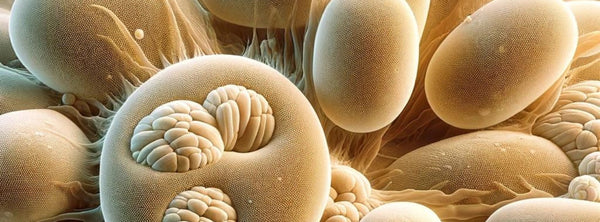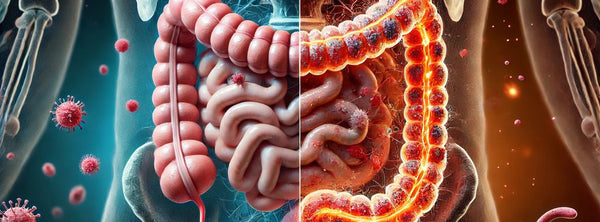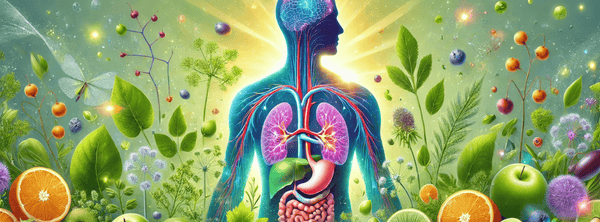
For some, the kidneys may be viewed as just another organ, one which eliminates waste via the urine, but they are so much more, and the importance of their essential life-promoting qualities is often overlooked. People often focus on improving liver detoxification or cleansing the colon without understanding how vital the Kidneys are for their long-term health and wellness.
The Roles of the Kidneys
Most people know that the kidneys help to remove waste from the blood and excrete the toxins and acids via the urine, but did you know the Kidneys are also involved with;
- Production of New Red Blood Cells - the Kidneys secrete a hormone called erythropoietin (EPO) which tells the bone marrow to produce more red blood cells. This naturally occurs if we have anaemia - low iron, excessive bleeding, hypoxia - low oxygen or in the normal turnover and production of new red blood cells.
- Acid Alkaline Balance - our Kidneys regulate the pH levels of the blood and extracellular fluid. If our acid levels are too high, we can suffer from fatigue, headaches, confusion, increased heart rate and shortness of breath. Many health conditions, including cancer, heart disease, dementia, and inflammation, thrive in an acidic environment. If our body is too alkaline, we may suffer from nausea, numbness, tremors, spasms, confusion or a coma. The role of the Kidneys is to remove excess acid or bicarbonate from the blood to maintain a healthy balance between acid and alkalinity.
- Controls Blood Pressure - blood is essential to Kidney function, and if the flow drops by 30%, then the Kidneys can die, and so will we. To combat any reduction in blood flow to the Kidneys, they produce a hormone called renin which stimulates the production of angiotensin, which tells the adrenal glands to release aldosterone. This effect causes the kidneys and colon to put more sodium back into the bloodstream to increase blood volume. In addition aldosterone constricts the blood vessels resulting in the heart having to work harder to pump blood throughout the body.
- Regulates the Water Balance - the Kidneys control the amount of water they excrete or retain via the Anti Diuretic Hormone (ADH). The pituitary gland releases ADH in reaction to how much water we drink, our sodium content, excessive fluid loss (vomiting, diarrhoea, sweating) or certain pharmaceutical medications such as corticosteroids.
- Controls Electrolyte Levels - electrolyte is a term for minerals that can be electrically charged and profoundly affect our metabolic health. Electrolytes include sodium, potassium, chloride, calcium, phosphate, magnesium and bicarbonate. The Kidneys play a vital role in motioning the correct balance of these minerals, and if our levels are too high, they excrete the excess in the urine, or if they are too low, they retain them in the blood.
- Activates Vitamin D - the vitamin D we receive from sunlight, and our food is inactive. The Kidneys role is to convert this form of vitamin D to its active form so it can be utilised by the immune system, bones, heart and brain.
- Histamine Control - the Kidneys express enzymes that synthesise and metabolise histamine. The science isn't definitive, but it is believed that poor-functioning Kidneys can lead to elevated blood histamine, which can in turn exacerbate allergies.[1]
- Filters The Blood - approximately 190 litres of blood passes through a complex system of tiny cells called nephrons in which toxins, poisons, acids and bases are removed and excreted via the urine.
How The Kidneys Work
Blood flow is essential to proper Kidney function. It flows through the renal artery and branches to a million tiny capillaries, feeding special Kidney cells called nephrons. The blood flowing into these nephrons passes through a series of small blood vessels called the glomerulus, which allows toxic particles, acids, bases and water to pass through and collect in structures called tubules to be transported to the bladder for elimination.
What Damages Kidney Function?
The Kidneys are a vital organ working tirelessly to maintain our health while effectively dealing with toxins and poisons. Unfortunately, certain health conditions and lifestyle choices can detrimentally impact Kidney health and lead to Chronic Kidney Disease.
- High Blood Pressure - think of normal blood pressure as the force of the water pouring out of a garden hose, whereas high blood pressure is the force of water coming out of a fire hydrant hose. The extra pressure severely damages the sensitive capillaries and glomerulus, feeding the nephrons, thus impeding their ability to cleanse the blood and effectively remove toxins, bases and acids.
- Type 1 and Type 2 Diabetes - lead to an elevation in blood sugar, which damages the Kidney filtering cells called nephrons by causing them to become thick and stiff, thus reducing their ability to remove waste from the blood effectively. Diabetes also increases the risk of high blood pressure, thus damaging the kidneys further.
- Smoking - can lead to high blood pressure and increases the risk of kidney cancer and renal stenosis - narrowing of the blood vessels supplying the kidneys.
- Obesity - increases Kidney damage by altering the secretions of fat cells, which promote inflammation, oxidative stress, and fibrosis within the Kidneys, thus leading to impaired renal function and blood toxicity. In addition, obesity increases the risk of high blood pressure and diabetes, both common causes of Kidney disease.
- Alcohol - cause changes in Kidney function and reduces their ability to filter toxins and alcohol effectively, thus leading to acidity and toxic buildup in the blood. Alcohol also inhibits the production of the Anti Diuretic Hormone, which causes excess urination and leads to dehydration. Two or more drinks per day have been shown to contribute to developing high blood pressure, the most common cause of Kidney Disease.
- Long-Term Obstruction of the Urinary Tract - an enlarged prostate, Kidney stones, bladder or colon cancer, restricts the flow of urine from the bladder, resulting in the build-up of urine that flows back up to the Kidneys and damages the nephrons leading to reduced filtering ability and further toxic accumulation of the blood.
- Glomerulonephritis - is inflammation of the glomerulus, which is the internal blood supply of the nephron. It generally becomes inflamed due to an infection or the over-activation of the immune system and is seen in autoimmune diseases such as Lupus or IgA nephropathy.
- Interstitial nephritis - is inflammation of a collection of cells, extracellular matrix, and fluid surrounding the renal tubules. Common causes include infection and a reaction to pharmaceutical drugs, including analgesic, reflux, antiviral and anti-inflammatory medication plus antibiotics. Medications are estimated to cause 71% to 92% of Interstitial nephritis cases.
- Polycystic Kidney Disease - is a genetic disorder that causes a build-up of cysts within the Kidneys, which impede the nephrons from working effectively, thus increasing blood toxicity.
- Recurring Kidney Infections - including urinary tract and bladder infections these can damage the Kidneys and be quite painful. Bacteria are not ordinarily present in the urine. Still, if they are, they are generally flushed away by the urine, but if the immune system is weak opportunistic infections can take over and damage nephrons and their ability to filter toxins effectively.
Signs of Poor Functioning Kidneys and Deterioration
The body always talks to us and lets us know if it is not happy. The Kidneys have their own language and let's us know through signs and symptoms that it needs help. They include;
|
|
|
|
|
|
|
|
|
|
|
|
|
|
|
|
|
|
|
|
|
|
|
|
|
|
|
|
|
|
|
|
|
|
|
|
|
|
|
|
|
|
|
|
|
|
|
|
|
|
|
|
|
|
Pharmaceutical Drugs That Reduce Kidney Function
Pharmaceutical medications may offer relief from symptoms, but certain drugs can harm the Kidneys and interfere with their function, including the following;
- Antibiotics - when metabolised, form crystals that are insoluble in water as they pass into the tubules; they obstruct urine flow. This results in inflammation and a reduced ability to function effectively.
- Antivirals - have the same reaction in the kidneys as antibiotics do.
- Non-Steroidal Anti-Inflammatory Drugs - including aspirin, ibuprofen, naproxen, mobic or vioxx can reduce blood flow to the Kidneys, and long-term use can damage the nephrons.
- Protein Pump Inhibitors - including somac, pariet, nexium and losec can lead to acute interstitial nephritis, an inflammatory condition with oedema affecting the fluid-filled spaces in the Kidneys, thus reducing its ability to function properly.
- Blood Pressure Medication - in particular, ACE inhibitors (monopril, captopril, algae, ramipril, trandolapril) can contribute to Kidney damage, especially when taken for a long time.
- Laxatives - containing sodium phosphate can cause deposits of phosphate crystals, which lead to impaired urine flow and kidney function.
- Diuretics - used to treat high blood pressure and fluid retention can lead to dehydration, increasing kidney toxicity.
- Methotrexate - a chemotherapy agent and immune suppressant, like antibiotics, produce insoluble crystals that reduce urine flow and damage kidney function.
Blood Tests That Show Poor Kidney Health
Thankfully, a few standard blood tests can indicate kidney health and early warning that your kidneys may need some support.
- Creatine - is a waste product made by the muscles and removed via the kidneys. High levels can indicate reduced filtering function of the kidneys.
- Urea or Blood Urea Nitrogen (BUN) - occurs from the breakdown of proteins in our foods. Higher than normal levels indicate reduced Kidney function.
- Albumin - is a significant blood protein, and high levels in a urine test can tell the Kidneys are damaged, as a healthy Kidney does not let albumin pass from the blood into the urine.
- Estimated Glomerular Filtration Rate (eGFR) - measures how well the Kidneys filter waste from the blood and is the best test in determining Kidney health. Healthy filtration rates are about 90–100 millilitres every minute. Figures less than that indicate various stages of Kidney disease.
- A flow rate between 60 and 89 indicates stage 2 Kidney disease
- A flow rate between 45 and 59 indicates stage 3a Kidney disease
- A flow rate between 30 and 44 indicates stage 3b Kidney disease
- A flow rate between 15 and 29 indicates stage 4 Kidney disease
- A flow rate below 15 marks stage 5 Kidney disease and the beginning of dialysis.
Kidneys From A Chinese Perspective
Whereas modern western medicine sees the Kidneys as an excellent filtering system that removes waste and toxins from the blood, traditional Chinese medicine views the Kidneys in a completely different light. They believe that the Kidneys are the organ that stores and manages a person's Qi, a life force that flows throughout the whole body. According to Chinese Medicine, the Kidneys are the storage organ for the Qi that we inherited from our parents, and it is this Qi that is shared with other organs when their own Qi wanes.
The Kidney Qi supports healthy growth, maturation and ageing throughout life of our mind, body and spirit. It also controls critical reproduction elements. If we look at the health of the Kidneys from a Chinese perspective (and they have been doing this for 5000 years), we then start to appreciate how important it is to keep our Kidneys healthy because they are so much more than a filtration organ.
Foods For The Kidneys
The most critical nutrient the Kidneys need is water-free from chemicals like chlorine, ammonia and fluoride. Water is essential to help the nephrons remove toxins effectively. Freshly squeezed juices and herbal teas also constitute water, so try to consume around 2 litres per day more if you are sweating or exercising. Avoid caffeine beverages and alcohol as they act as a diuretic and increase fluid loss via the Kidneys.
Eating a wide variety of nutrient-rich foods, including fruits, vegetables, nuts, seeds, beans, protein, herbs, algae and grasses, provides the Kidneys with deep nutrient and antioxidant reserves that help protect them from the destructive forces of modern-day living.
Black or dark purple foods - including blackberries, black sesame, and black chia seeds, but not confectionary liquorice 😀 help to nourish the Kidneys and their Qi according to Traditional Chineses Medicine.
Green foods - including vegetables, salads, fruits, herbs, algae and grasses have diuretic and alkalising actions that help flush the Kidneys of toxins and excess fluids, plus are rich in antioxidants that protect the Kidneys from toxic damage.
Foods with a high water content - including watermelon, cucumber, zucchini, tomatoes, apples, citrus, stone fruit and celery, are excellent foods to help the kidneys flush toxins.
Beans - are shaped like kidneys and are seeds that are the starting point of new life. In traditional Chinese medicine beans considered very nourishing for the Kidneys.
Grains - such as barley and millet help to nourish the Kidneys by improving Kidney Yin energy.
Many cultures believe that the Kidneys are the body's water organ, and foods with a high water content or come from the water (seafood) all support Kidney function.
For people suffering from Chronic Kidney Disease, certain foods cannot be eaten, particularly those high in potassium and phosphorus. For more information on these foods, please download our FREE Kidney Cleanse Treatment Plan
Herbs For The Kidneys
Whereas foods help support the Kidneys, Mother Nature has developed her own medicine to supercharge Kidney Function.
Astragalus - has an adaptogenic effect on the kidneys and can maintain stable glomerular filtration rate levels and delay dialysis initiation in patients with progressive chronic kidney disease.[2] Astragalus inhibits oxidative stress, which is a characteristic of early diabetic nephropathy, a leading cause of end-stage renal disease. Astragalus was first recorded in Traditional Chinese Medicine about two thousand years ago.
Burdock - many cultures have valued Burdock for thousands of years for its blood cleansing and diuretic properties, which cleanse the kidneys and helps them remove excess fluid and toxins. Burdock Root reduces inflammation of the kidneys and improves glomerulonephritis. In addition, Burdock Root enhances the antioxidant status in the kidneys, prevents oxidative stress during kidney infections and reduces kidney fibrosis.
Dandelion - a stubborn lawn weed high in Vitamins A, C, D, and B-Complex, Iron, Magnesium, Zinc, Potassium, Copper and Calcium, which tones and nourishes the kidneys. Dandelion is a potent diuretic [3] that helps flush toxins from the kidneys and reduce the incidence of kidney stones, urinary tract and kidney infections, inflammation, and congestion.
Gynostemma - an essential adaptogenic herb from China that has shown to improve renal function. Gynostemma improves the Kidneys ability to filter toxins by enhancing the glomerular filtration rate and protecting kidney cells from toxins that cause renal fibrosis, the final stage of chronic kidney disease. Gynostemma also induces apoptosis (death) of renal cell carcinoma.
Parsley - a popular culinary herb rich in antioxidants and diuretic properties that help flush toxins and protect the kidneys from toxic damage. Traditionally Parsley was used to remove congestion of the kidneys and fluid retention caused by improper kidney function. Parsley has shown benefits in preventing and managing kidney stones and gravel.[4]
St Mary's Thistle - known as milk thistle, protects the kidneys from congestion and toxic damage due to its unique antioxidant profile. St Mary's Thistle and Dandelion protect the kidneys from drug and diet toxins that lead to oxidative stress and tissue damage. In the past two decades, St Mary's Thistle has demonstrated remarkable anticancer and chemopreventive abilities in many cancers, including Kidney.
Clivers - has a decisive diuretic action that helps flush the kidneys of toxins, poisons, acids, excess fluids and dissolves kidney stones. Clivers, also known as cleavers, has a soothing demulcent action that helps calm an inflamed urethra and prevent urinary tract infections.
Dong Quai - a famous traditional Chinese medicine herb, has been used for centuries to strengthen Kidney energy and open up blood flow to the nephrons. Dong Quai has shown to reduce the progression of Chronic Kidney Disease [5] and increase the Kidneys production of erythropoietin (EPO), and improve anaemia [6]. Dong Quai may also help improve renal stenosis (narrowing of the renal artery) which improves blood flow to the Kidneys.
Nettle Leaf - that painful stinging leaf has excellent diuretic properties that help the Kidney flush toxins and remove excess fluid. Nettle leaf is a potent anti-inflammatory herb with strong antioxidant properties that help protect the Kidneys from environmental toxins.
Rehmannia - is another beneficial herb used in traditional Chinese medicine that shows substantial benefits for kidney health and slows the progression of chronic kidney disease [7] Animal studies show that Rehmannia decreases the decline of glomerular filtration rate, reduces serum creatinine, improves renal blood flow, reduces renal sclerosis and tubal fibrosis.
What We Do In Our Clinic To Help Improve Kidney Function
Kidney Support - is a blend of Mother Nature's finest healing herbs that help rebalance, revitalise and regenerate kidney function and enhance their filtering ability, blood flow, and vital Qi.
Antioxidant Support - a blend of fruits, vegetables and herbs high in antioxidants that help protect the kidneys from the harmful effects of toxins, poisons and acids while supporting its detoxification processes.
Green Cleanse - a blend of green superfoods rich in vitamins and minerals that cleanse, nourish and revitalise kidney function, enhance filtration and support the accumulation of kidney Qi.
Don't forget your Furry Friends checkout NatroVital For Pets Kidney Care
Your FREE Kidney Cleanse Treatment Plan
The information provided in this health article, '10 Common Causes of Poor Kidney Health,' is intended for educational purposes only. We make no claims to diagnose, treat, prevent, alleviate or cure illnesses or diseases with any information or product stated. We suggest you consult your healthcare professional before undertaking any health treatment with any health issue.
We hope you found this article on the 10 Common Causes of Poor Kidney Health. To assist us in helping others, please leave a comment or share this post on social media.
Thanks, and have a great day.



